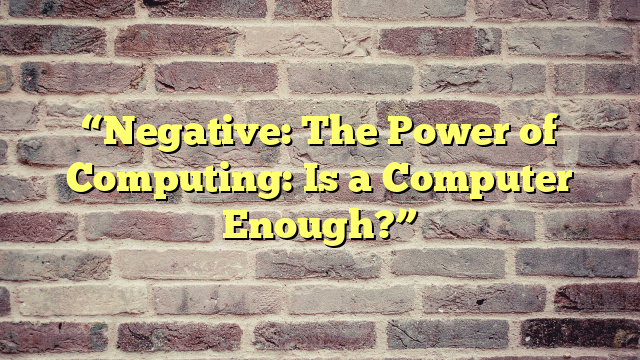Introduction:
In today’s digital age, computers have become an essential part of our daily lives. From education and work to entertainment and communication, computers have revolutionized the way we live and interact with the world. With the rapid advancement of technology, computers have become more powerful and versatile, capable of performing complex tasks and calculations in a matter of seconds. However, with this power comes a significant question – is a computer enough? In this article, we will explore the negative aspects of computing and delve into the discussion of whether a computer is sufficient for all our needs.
Subheading 1: The Dependence on Technology
With the increasing reliance on computers, we have become heavily dependent on technology for our daily activities. From managing our schedules and finances to staying connected with friends and family, we rely on computers for almost everything. This dependence has made us vulnerable to the consequences of technology failures. With a single malfunction or a virus attack, our entire digital life can come crashing down, causing chaos and disruption. Moreover, our dependence on technology has made us less self-sufficient and more reliant on machines, leading to a decline in practical skills and problem-solving abilities.
Subheading 2: The Threat of Cybersecurity
While computers have made our lives more convenient and efficient, they have also opened the door to a new form of crime – cybercrime. With the growing number of cyberattacks and data breaches, our personal information and sensitive data are constantly at risk. Hackers and cybercriminals can easily exploit the vulnerabilities of computers and gain access to our personal information, leading to identity theft and financial fraud. Despite the advancements in cybersecurity, the threat of cybercrime continues to loom, making our reliance on computers a double-edged sword.
Subheading 3: The Impact on Human Interaction
As we spend more time on our computers, we tend to neglect face-to-face interactions, leading to a decline in social skills and relationships. With the rise of social media and online communication, we have become more distant and disconnected from the people around us. This lack of human interaction can have a detrimental impact on our mental and emotional well-being, leading to feelings of isolation and loneliness. Moreover, the overuse of computers can also lead to physical health issues such as eye strain, headaches, and poor posture.
Subheading 4: The Loss of Privacy
In today’s digital world, privacy has become a luxury. With the constant use of computers and the internet, we leave a trail of digital footprints that can be tracked and used for various purposes. From targeted advertising to government surveillance, our online activities are constantly monitored, compromising our privacy. With the rise of smart devices and the Internet of Things (IoT), our homes and personal spaces are also vulnerable to invasion, raising concerns about the loss of privacy in our own homes.
Subheading 5: The Negative Impact on the Environment
The manufacturing and disposal of computers have a significant negative impact on the environment. The production of computers requires the use of non-renewable resources and harmful chemicals, contributing to pollution and climate change. Moreover, the disposal of electronic waste from obsolete or damaged computers also poses a threat to the environment, as the toxic components can contaminate the soil and water. As the demand for more powerful computers continues to rise, the environmental impact of computing also increases.
Subheading 6: The Digital Divide
While computers have become an integral part of our lives, not everyone has access to them. The digital divide refers to the gap between those who have access to technology and those who do not. In developing countries and marginalized communities, access to computers and the internet is limited, creating a digital divide that hinders their progress and development. This disparity in access to technology also leads to a lack of digital skills and knowledge, creating a barrier to social and economic opportunities.
Subheading 7: The Loss of Creativity and Originality
While computers have made our lives more convenient, they have also made us more reliant on templates and pre-designed solutions. With the abundance of software and tools, we tend to rely on them for creativity and originality, leading to a loss of individuality. Moreover, the ease of access to information and the constant need for instant gratification has also affected our ability to think critically and creatively. As a result, our dependence on computers has led to a decline in innovation and originality.
Conclusion:
In conclusion, while computers have undoubtedly brought about numerous benefits and advancements, they also come with negative consequences. From our dependence on technology to the threat of cybercrime and the loss of privacy, computers have a significant impact on our lives and the environment. Therefore, it is crucial to strike a balance between the use of technology and maintaining our traditional skills and interactions. A computer may be a powerful tool, but it is not enough to fulfill all our needs and should not be relied upon entirely. It is essential to be mindful of the negative aspects of computing and use it responsibly for

